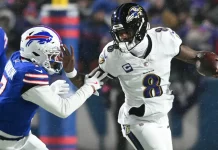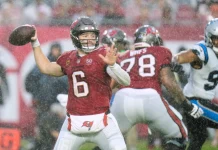Denver’s Nikola Jokic now knows how Philadelphia’s Joel Embiid felt during two previous NBA award seasons.
Second in the MVP race — but only second-team All-NBA.
Embiid — the newly crowned MVP — headlined the All-NBA team unveiled Wednesday night. He was the first-team center, while Jokic was the second-team pick at that position. It was a reversal of the results from 2021 and 2022, when Jokic was MVP over Embiid, who then had to settle for the second-team All-NBA center spot.
And this should be the final time such a quirk happens. Starting next year, the All-NBA team will no longer be broken down by position — meaning the presumed second-best player in the NBA one season, such as Embiid in 2021 and 2022 and Jokic now, will not have to be relegated to second-team anything.
Joining Embiid on the first team were Boston’s Jayson Tatum and Milwaukee’s Giannis Antetokounmpo at forward, and Dallas’ Luka Doncic and Oklahoma City’s Shai Gilgeous-Alexander at guard.
On the second team along with Jokic were Miami’s Jimmy Butler and Boston’s Jaylen Brown at forward, and Golden State’s Stephen Curry and Cleveland’s Donovan Mitchell at guard.
The third team center was Sacramento’s Domantas Sabonis, with the Los Angeles Lakers’ LeBron James — now a 19-time selection, extending his record — and New York’s Julius Randle getting the forward spots and Sacramento’s De’Aaron Fox and Portland’s Damian Lillard the guard selections.
Omitted this year after making it last year: first-teamer Devin Booker; second-teamers Ja Morant, Kevin Durant and DeMar DeRozan; and third-teamers Karl-Anthony Towns, Chris Paul, Trae Young and Pascal Siakam.
James is a 13-time first-team, three-time second-team and now three-time third-team pick. Kobe Bryant, Tim Duncan and Kareem Abdul-Jabbar were all 15-time selections, tied for the second-most in NBA history.
The picks were made by a panel of 100 reporters and broadcasters who cover the NBA.
Antetokounmpo was the only unanimous selection this season as a first-teamer. Tatum got 92 first-team votes, Embiid got 87, Gilgeous-Alexander got 63 and Doncic got 60.
Gilgeous-Alexander, Mitchell, Brown, Sabonis and Fox all made All-NBA for the first time. Embiid was first-team for the first time, while Butler made the second team for the first time after four appearances on the third team.
The league has utilized the current format of picking three All-NBA teams, by position — two guards, two forwards, one center on each — since 1989. From 1956 through 1988, there were two teams picked by position; from 1947 through 1955 there were two teams picked, but with no regard for position.
More often than not, the system works without a glitch. The top finalists for MVP typically have found their way onto the All-NBA first team.
But there have been notable exceptions — often involving centers, who are vying for just the one All-NBA first-team spot instead of the two that have been available to guards and forwards.
Embiid was second in the MVP race but only second-team All-NBA in the most recent two seasons. Other examples:
— 1994-95, MVP David Robinson got the first-team nod and runner-up Shaquille O’Neal wound up as the second-team center pick.
— 1993-94, Hakeem Olajuwon won MVP and was first-team at center, while Robinson was No. 2 in the MVP race and on the second team.
— 1976-77, Bill Walton was No. 2 in the MVP race, then second-team All-NBA behind MVP Kareem Abdul-Jabbar.
— 1975-76, Bob McAdoo was second in the MVP race and didn’t even make All-NBA, with the center spots that season going to MVP Kareem Abdul-Jabbar and third-place finisher Dave Cowens.
There have also been some split votes, albeit none under the current voting methods, where the MVP somehow didn’t make the All-NBA first team. It happened to Bill Russell in 1958, 1961 and 1962, and then to Cowens in 1973.
___
AP NBA: https://apnews.com/hub/NBA and https://twitter.com/AP_Sports






